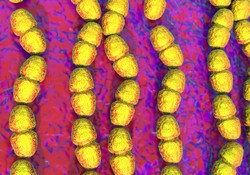A novel vaccine against Streptococcus
GBS is responsible for 50 % of life-threatening infections in new-borns causing pneumonia, sepsis and meningitis. Women at risk of transmitting GBS to infants during childbirth are administered prophylactic antibiotics, which has considerably reduced the incidence of infections occurring within the first week of life. However, this has increased the emergence of antibiotic resistant bacteria, while it negatively impacts the development of the microbiome of the child. To address the issue, scientists of the EU-funded NEOSTREP(opens in new window) (Development of Group B Streptococcal vaccine to alleviate emerging antibiotic resistance through elimination of current prophylactic antibiotic strategies in GBS prevention) project proposed to develop a vaccine for women during pregnancy. Their hypothesis was that vaccination will result in the induction of protective antibodies in the mother that will be transferred across the placenta to the unborn child. Researchers worked to manufacture the previously identified GBS-NN vaccine candidate for clinical use. The GBS-NN vaccine uses a fusion protein made up of the two N-terminal domains of two GBS surface proteins (Rib and AlphaC). Following production of clinical grade GBS-NN, the consortium performed preclinical toxicology studies as well as dose-escalation and dose-confirmation clinical trials. The results were very encouraging, documenting the safety and immunogenicity of the vaccine as early as two weeks after the first administration. In addition, the vaccine was effective against both laboratory and clinical isolates of GBS. Mechanistic insight indicated the production of IgG1 and IgA antibodies that were capable of crossing the placenta and then secreted in mother’s milk, respectively. Interestingly, scientists discovered that the produced antisera also bound and killed GBS, thereby preventing host invasion. NEOSTREP results have been thoroughly disseminated to pharmaceutical stakeholders for the commercialisation of the vaccine. The widespread clinical use of the vaccine is expected to eliminate the threat of GBS infection.







